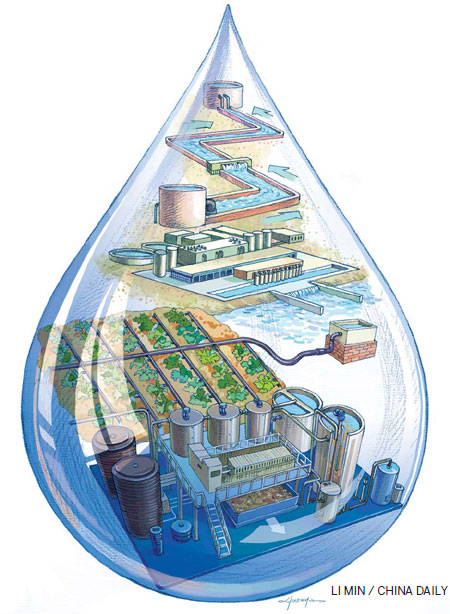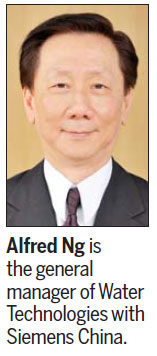Water future
Updated: 2012-03-09 08:36
By Meng Jing (China Daily)
|
||||||||

 |
Opportunities galore for foreign companies as demand for strategic resource escalates in China
Water, water, everywhere but not really in China. Though an important strategic resource, it has always been in short supply and wasted aplenty, without much thought for its conservation. But two recent government announcements may well prove the old adage wrong.
A work report submitted to the National People's Congress, China's top legislature, indicated that the government is planning to impose strict controls on water resources management to prevent misuse. Last month, the Ministry of Water Resources said it would invest more than 140 billion yuan ($22.2 billion, 16.9 billion euros) on water conservancy projects this year, while the total investment on such projects between 2011 and 2015 is expected to be about 1.8 trillion yuan.
Though China accounts for about 20 percent of the global population, its freshwater resources are just 7 percent. Despite the shortfall, the nation has been able to maintain a bumper harvest for eight consecutive years, something that Chen Lei, minister for water resources, terms as a "China Miracle."
But Chen knows his task is far from over and that the road ahead is a bumpy one. Though the main priority is to conserve water resources, efforts are also on at the ministry to utilize the existing resources fully, without wastage. Steps to channel more foreign investment to the sector are also being charted and China is hoping to make a lasting impression at the 6th World Water Forum in Marseille, France on March 12.
Since 2008, China has added more than 50 million people to its population, while its freshwater resources have fallen by 11.4 percent to 2,402 billion cubic meters, according to the National Bureau of Statistics. The per capita water resources quota in China is 2,100 cubic meters, or 28 percent of the global average. A study "Charting Our Water Future", by global consultancy McKinsey and the Water Resources Group, says that by 2030 China could face a gaping water shortage of 201 billion cubic meters, which is about one-third of China's current annual consumption of 600 billion cubic meters.
Water security has now become an integral issue for the government, says Zhong Lijin, senior associate at the China office of the World Resources Institute, a Washington-based global environmental think tank, referring to the recent "strict water resources management system".
|
||||
The new guidelines for water management have specific objectives for water consumption, water efficiency and water pollution, including "capping the maximum volume of water consumption at 700 billion cu m by 2030" and "cutting down water consumption per 10,000 yuan worth of industrial value to 40 cu m".
Experts say these are not easy goals to achieve, as water conservation efforts are still at a nascent stage in China. But the government remains confident it will be able to address these issues in the long run.
Deputy Minister for Water Resources Jiao Yong and EU ambassador to China Markus Ederer, along with the Danish and Portuguese ambassadors, have decided to set up a China Europe Water Platform at the 6th World Water Forum to promote policy dialogue between China and Europe on water sector reforms and to encourage capacity-building, research and business cooperation.
According to Ederer, water will emerge as the "new gold" and an integral part of future global security, considering there is tremendous pressure on water resources from climate change, urbanization and economic growth.
China's rapidly expanding water sector, valued at $48 billion, is currently the third largest in the world, according to research firm GWI Global Water, behind the United States at $110 billion and Japan at $59 billion. Analysts estimate that the industry value may triple to $150 billion over the next five years.
Private equity and venture capital firms have been spearheading the "green gold" rush in China. PE and VC investment in China's water sector has surged more than nine times to $406 million in 2011 from $44.16 million in 2010, according to consultancy firm China Venture.
"In terms of the water sector, China is not one of our company's priorities in the world. It is our top priority," says Jorge Mora, Asia CEO of Veolia Environmental Services.
"There is no country in the world that would have sustainable development without water. If you don't have enough water, it affects every aspect of your life. Your GDP growth and your development can be challenged or even stopped due to a severe shortage of water," Mora says.
The water crisis is certainly a challenge for sustainable development in China. But what makes the country an important market for companies like Veolia is the fact that the daily per capita consumption of water in China is still low and about one-quarter of the global average. In China, people consume about 100 liters of water every day, whereas it is 200 liters in Europe and 700 liters in the US.
"It would be a huge disaster if the demand for water goes up among the over 1.3 billion inhabitants in China," Mora says. But it is something that is bound to happen, say experts, pointing to the rapid urban expansion, growing middle class, sanitation requirements and lifestyle changes as the catalysts for the increased demand.
Nowhere is the trend for rising water resources more evident than in Beijing, the capital of China. Though its population has increased by more than 40 percent in the past decade, its annual per capita water availability has dropped significantly from 300 cu m to 100 cu m in the past two to three years, which is nearly one 10th of the internationally reorganized critical level of 1,000 cu m. The deeper pockets of Beijing's residents have also continued to drive up water consumption in the city's thousands of spas, bathhouses, car-wash companies and dozens of golf courses.
All of these have forced Beijing to channel water from neighboring provinces, such as Hebei and Shanxi, which themselves are not rich in water resources. The capital is now pinning its hopes on the South-to-North Water Diversion Project, the largest of its kind in the world, which is expected to bring 1 billion cubic meters of water to Beijing by 2014 and help the city end underground water extraction.
Ma Jun, an environmentalist and author of China Water Crisis, says that the government's goal of using less than 700 billion cu m of water every year by 2030 is daunting and needs to be backed with significant efforts to improve water efficiency. "China uses around 600 billion cu m of water a year, which was the maximum amount originally set to reach after 2015," says Ma, director of the Institute for Public and Environmental Affairs and one of Time magazine's 100 most influential persons in the world in 2006.
Experts say with 70 percent of China's water resources being used for agriculture purposes, effective irrigation techniques are vital for attaining the conservation goals. Of the 120 million hectares of cultivated land in China, only 53.3 million hectares have basic irrigation measures and facilities. The area equipped with high-efficiency, water-saving irrigation techniques, such as sprinklers and drip irrigation systems, was just 1.3 million hectares by the end of 2011, according to the Ministry of Water Resources.

 Relief reaches isolated village
Relief reaches isolated village
 Rainfall poses new threats to quake-hit region
Rainfall poses new threats to quake-hit region
 Funerals begin for Boston bombing victims
Funerals begin for Boston bombing victims
 Quake takeaway from China's Air Force
Quake takeaway from China's Air Force
 Obama celebrates young inventors at science fair
Obama celebrates young inventors at science fair
 Earth Day marked around the world
Earth Day marked around the world
 Volunteer team helping students find sense of normalcy
Volunteer team helping students find sense of normalcy
 Ethnic groups quick to join rescue efforts
Ethnic groups quick to join rescue efforts
Most Viewed
Editor's Picks

|

|

|

|

|

|
Today's Top News
Chinese fleet drives out Japan's boats from Diaoyu
Health new priority for quake zone
Inspired by Guan, more Chinese pick up golf
Russia criticizes US reports on human rights
China, ROK criticize visits to shrine
Sino-US shared interests emphasized
China 'aims to share its dream with world'
Chinese president appoints 5 new ambassadors
US Weekly

|

|










